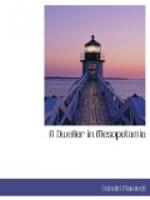Suddenly we came upon a scene of strange beauty and dramatic effect. A turn in this narrow and cloister-like way brought us to an arched opening, with some steps leading to the water. It was a sheltered inlet from the surging and swirling stream of the Tigris, a kind of pocket built round by crazy old balconied buildings. This was filled with goufas, the weird round boat of the upper river, and the animated scene of people either embarking or disembarking made a strange people. We saw this scene for a few moments only, as we made our way through the crowd at this point. I have since wondered where all these goufas were going. They could not have intended to cross the river under present conditions. I think the rapidly rising river must have upset all calculations as to mooring boats at this point and their owners were making sure that they were secure. The noise and apparent excitement was probably nothing but the usual Eastern custom of making a great fuss about nothing.
[Illustration: MAHAILAS AND MARSH ARAB’S BELLAM]
At last, after much marching and counter-marching, we struck the main thoroughfare leading to the Maude bridge, which we crossed. The thick, seething waters foamed and struggled against the pontoons and swept down between them like roaring devils. We were very glad to get over, for it looked as though a little more force would have carried the whole thing away. Once clear of the bridge we found ourselves in New Street, the thoroughfare made since the British occupation, and incidentally we ran into a cheery naval officer who picked us up and deposited us again at Navy House, whither he was bound. Had we not received this timely aid I think we should have gone on looking for Navy House all night. A more amazing situation for it could not have been found, if you searched the world over.
Wedged in, cheek by jowl, with buildings that might have figured in the tall streets of old London, it lay nowhere near the water, down a very narrow and crooked lane, where mules and men, camels and beggars jostled each other on their lawful occasions.
When we had settled down there and had fine weather for several days, Brown, loath to waste the romance of old Baghdad during glorious moonlight nights, insisted on some mysterious expeditions which were for the purpose of adventure, but ostensibly arranged to give me an opportunity of sketching. He produced an Arab, arrayed in strange garments, to carry a light and generally act as a guide. We called him the slave of the lamp. I am quite certain that he thought Brown was mad, but this belief on the whole was rather an advantage, as he treated him with all the more respect because of his affliction, which he regarded as a special visitation of Allah.
[Illustration: “By garden porches on the
brim,
The
costly doors flung open wide.”]
[Illustration: “All round about the fragrant
marge,
From
fluted vase and brazen urn,
In
order, Eastern flowers large.”]




